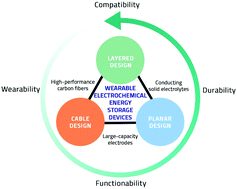Electrochemical energy storage devices for wearable technology: a rationale for materials selection and cell design
Abstract
Compatible energy storage devices that are able to withstand various mechanical deformations, while delivering their intended functions, are required in wearable technologies. This imposes constraints on the structural designs, materials selection, and miniaturization of the cells. To date, extensive efforts have been dedicated towards developing electrochemical energy storage devices for wearables, with a focus on incorporation of shape-conformable materials into mechanically robust designs that can be worn on the human body. In this review, we highlight the quantified performances of reported wearable electrochemical energy storage devices, as well as their micro-sized counterparts under specific mechanical deformations, which can be used as the benchmark for future studies in this field. A general introduction to the wearable technology, the development of the selection and synthesis of active materials, cell design approaches and device fabrications are discussed. It is followed by challenges and outlook toward the practical use of electrochemical energy storage devices for wearable applications.



 Please wait while we load your content...
Please wait while we load your content...